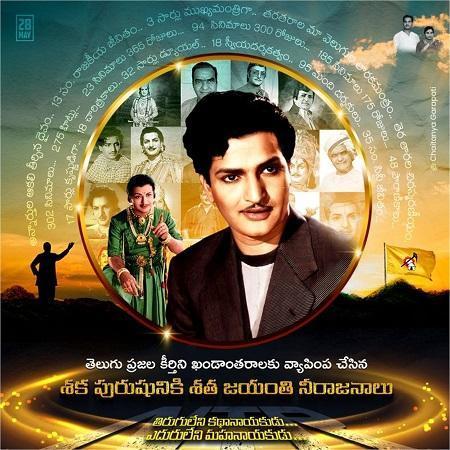
Nandamuri Taraka Rama Rao (NTR) was a prominent figure in Telugu cinema. And politics, and his influence has had a long-lasting impact on both realms. Why NTR s Influence entry into politics in the early 1980s brought about a significant shift in the political landscape. Of Andhra Pradesh, and his legacy continues to shape the Indian political system, particularly in the state of Andhra Pradesh.
Here is a detailed explanation of Why NTR s Influence impact and how his influence carries forward:
- Rise of Telugu Desam Party (TDP): NTR founded the Telugu Desam Party (TDP) in 1982 with the aim of championing the rights of the Telugu-speaking people. And addressing their grievances. The party emerged as a major alternative to the then-dominant Indian National Congress in Andhra Pradesh. NTR’s immense popularity as a film star played a crucial role in attracting a large support base for the TDP, leading to its landslide victory in the 1983 Assembly elections. This victory marked the beginning of NTR’s reign as the Chief Minister of Andhra Pradesh.
- Empowerment of Backward Classes: NTR’s political journey was characterized by his focus on the welfare and empowerment of the backward classes, particularly the farmers, rural communities, and socially disadvantaged groups. He implemented several pro-poor and pro-rural policies, such as land reforms, irrigation projects, and subsidized housing schemes. These measures aimed to uplift the marginalized sections of society and bridge the socio-economic gap.
- Regional Identity and Telugu Pride: NTR’s influence on Telugu politics was deeply rooted in the sentiment of regional identity and Telugu pride. He portrayed himself as a savior of Telugu culture, language, and heritage. This resonated with the masses and garnered immense support, as people saw NTR as a leader who would protect their interests and preserve their cultural identity.
- Electoral Politics and Populist Measures: NTR’s political strategy was centered around connecting with the common people and addressing their needs. He introduced several populist measures, such as the distribution of freebies like rice, money, and bicycles, to gain the support of the electorate. This style of politics, known as the “NTR style,” has been emulated by subsequent politicians, not only in Andhra Pradesh but also in other parts of India.
Impact on Indian Political System
Why NTR s Influence extends beyond Andhra Pradesh and has left a significant impact on the Indian political system. His success in using his popularity as a film star to launch a successful political career inspired several actors and celebrities to enter politics. NTR’s legacy paved the way for the emergence of film stars as influential political figures, both at the state and national levels.
In 1984, the TDP, under NTR’s leadership, formed a coalition government at the national level along with other non-Congress parties. This coalition, known as the National Front, played a significant role in national politics, and Why NTR s Influence became a prominent figure within the coalition.
NTR’s political ideology revolved around the protection of regional identity and autonomy. He advocated for the rights of regional states and highlighted the importance of decentralization.And federalism in the Indian political system. His strong stand on regional issues brought him recognition and influence on the national stage.
Mandal Parishad Reforms: NTR was a proponent of decentralization and believed.In empowering local governance bodies for effective and efficient administration. As Chief Minister of Andhra Pradesh, he introduced the concept of mandal parishads. Which were decentralized bodies at the sub-district level responsible for local governance and development. These mandal parishads aimed to bring decision-making and development closer to the grassroots level.
NTR’s efforts in implementing mandal parishads gained recognition at the national level. He advocated for similar reforms in other states and became instrumental. In shaping the discourse on decentralization and strengthening local governance in India. His ideas and initiatives influenced subsequent discussions on decentralization and were instrumental. In the establishment of similar institutions in other states.
Equal Property Rights for Women: NTR was a strong advocate for gender equality and women’s rights. During his tenure as Chief Minister, he introduced significant reforms aimed at granting equal property rights to women. Prior to these reforms, women in Hindu families were often subjected to discrimination and denied their rightful share of ancestral property.
NTR’s government passed the Andhra Pradesh Women’s Property Rights. Act in 1986, which sought to address this issue by ensuring equal rights for women. In matters of inheritance and property ownership. This landmark legislation aimed to empower women economically, socially, and legally. It challenged traditional patriarchal norms and helped in improving the status of women in society.
NTR’s initiative in granting equal property rights to women was path-breaking. And had a significant impact on women’s empowerment in Andhra Pradesh. It set an important precedent for other states in India, and subsequent legal and policy. Reforms were undertaken across the country to promote gender equality in property rights.
Why NTR is a force to reckon with
Following NTR’s demise in 1996, his political legacy continued within the Telugu Desam Party. Several of his family members, including his son Nara Chandrababu Naidu, have held important positions within the party and the state government. NTR’s focus on rural development, welfare schemes, and pro-poor policies has been carried forward by subsequent governments in Andhra Pradesh.
Furthermore, the emotional connection NTR had with the people of Andhra Pradesh. And his contributions to the state’s development have established a lasting legacy. Even today, NTR is revered as an iconic figure in Andhra Pradesh, and his influence continues. To shape the political discourse in the region. The recent 100th birth anniversary celebrations. Reflected how the TDP is carrying his political policies and legacy forward in the state.
NTR’s influence on the Centre for mandal parishad reforms and equal property. Rights for women demonstrated his commitment to social justice, decentralization, and gender equality. His efforts not only brought about tangible reforms in Andhra Pradesh. But also inspired wider discussions and reforms at the national level. The significance of these reforms continues to resonate and. Shape policies aimed at empowering local governance and promoting gender equality in India.
Finally, NTR’s influence in Telugu politics has had a profound and long-lasting impact. His rise as a political leader, emphasis on regional identity, populist measures, and focus. On the welfare of the marginalized sections of society have left an indelible mark on. Telugu people and many reputed political leaders across the globe. He is widely regarded as one of the greatest sons of Telugu soil.And a symbol of Telugu pride, even today.











